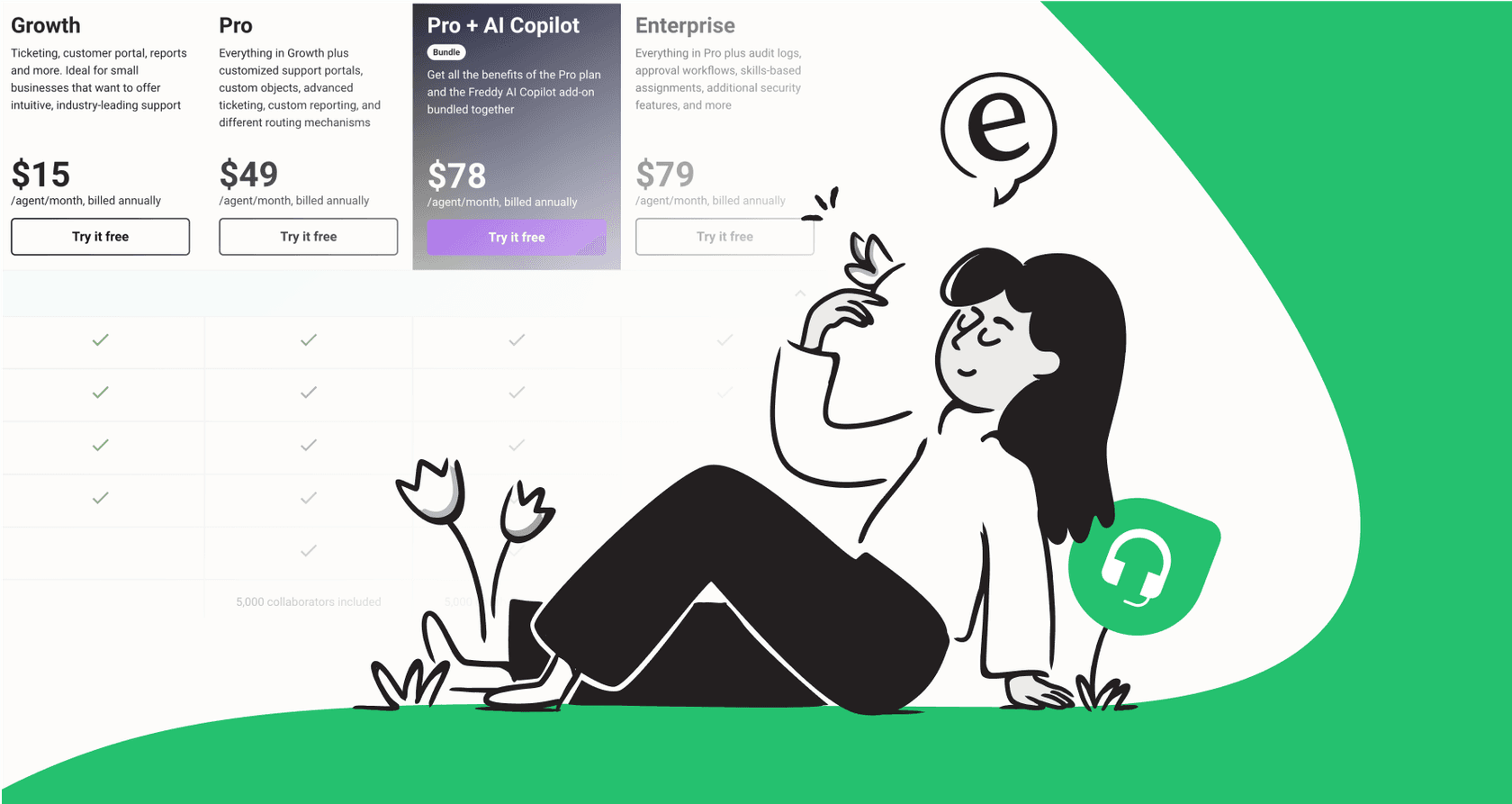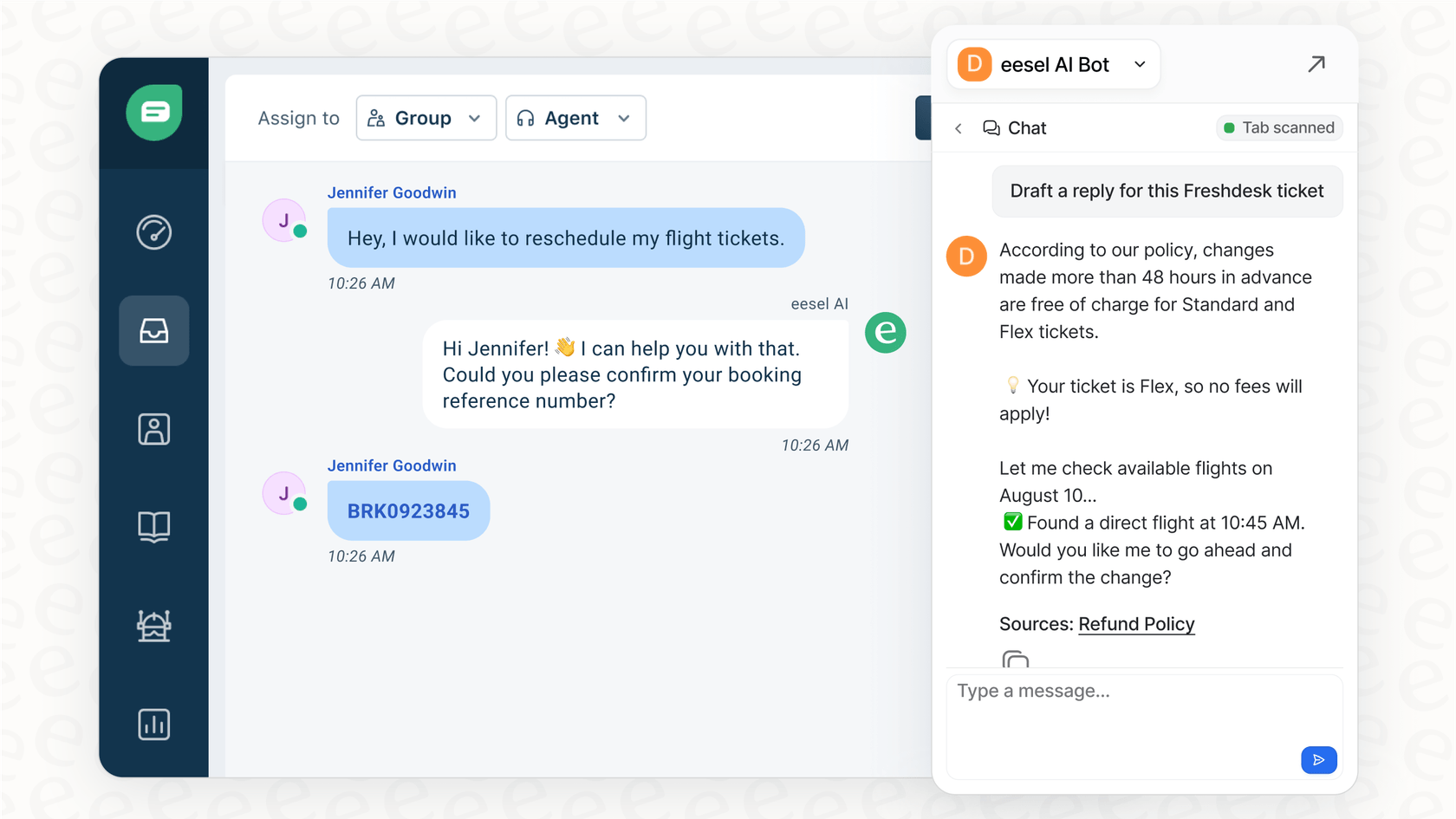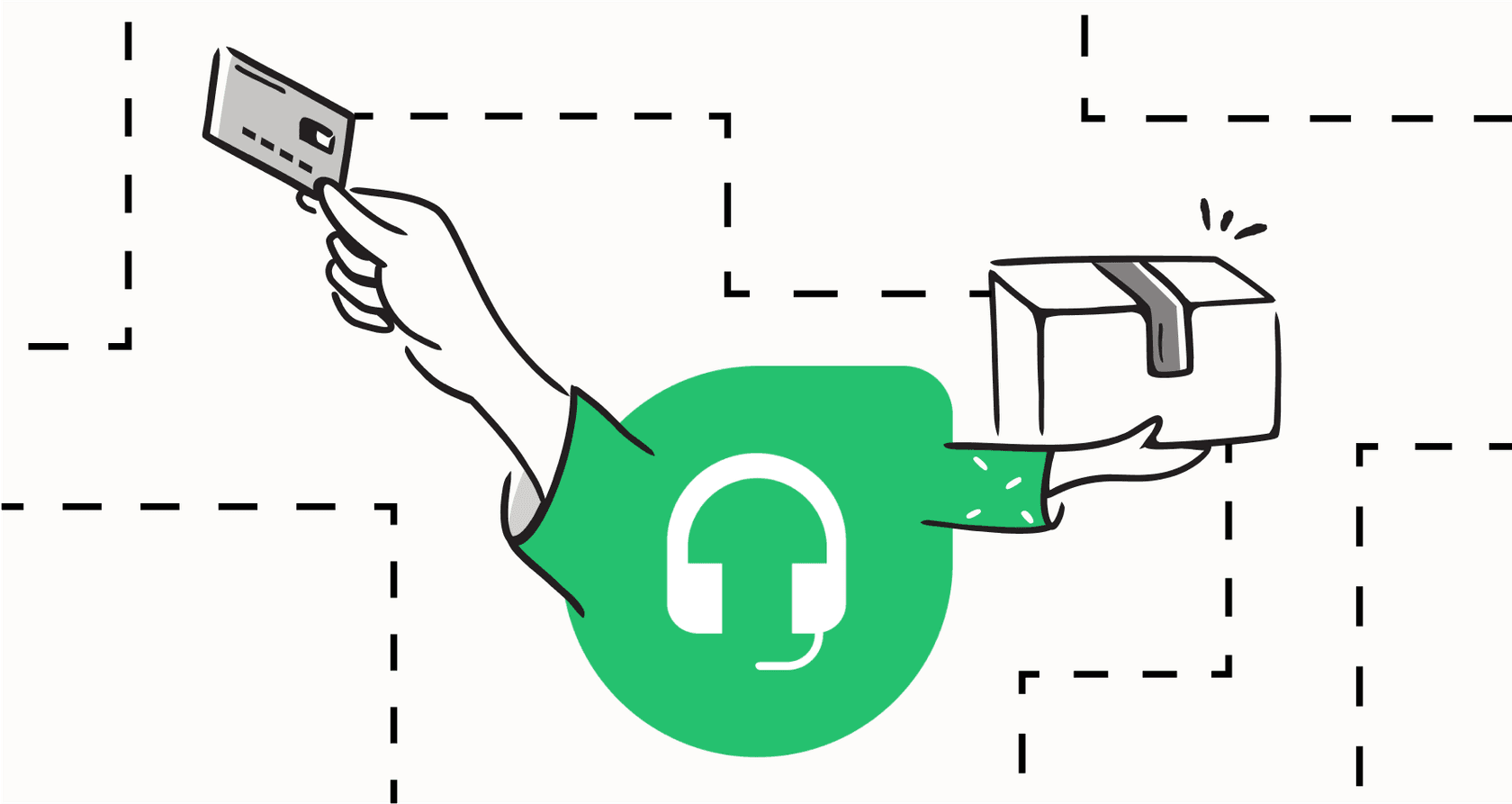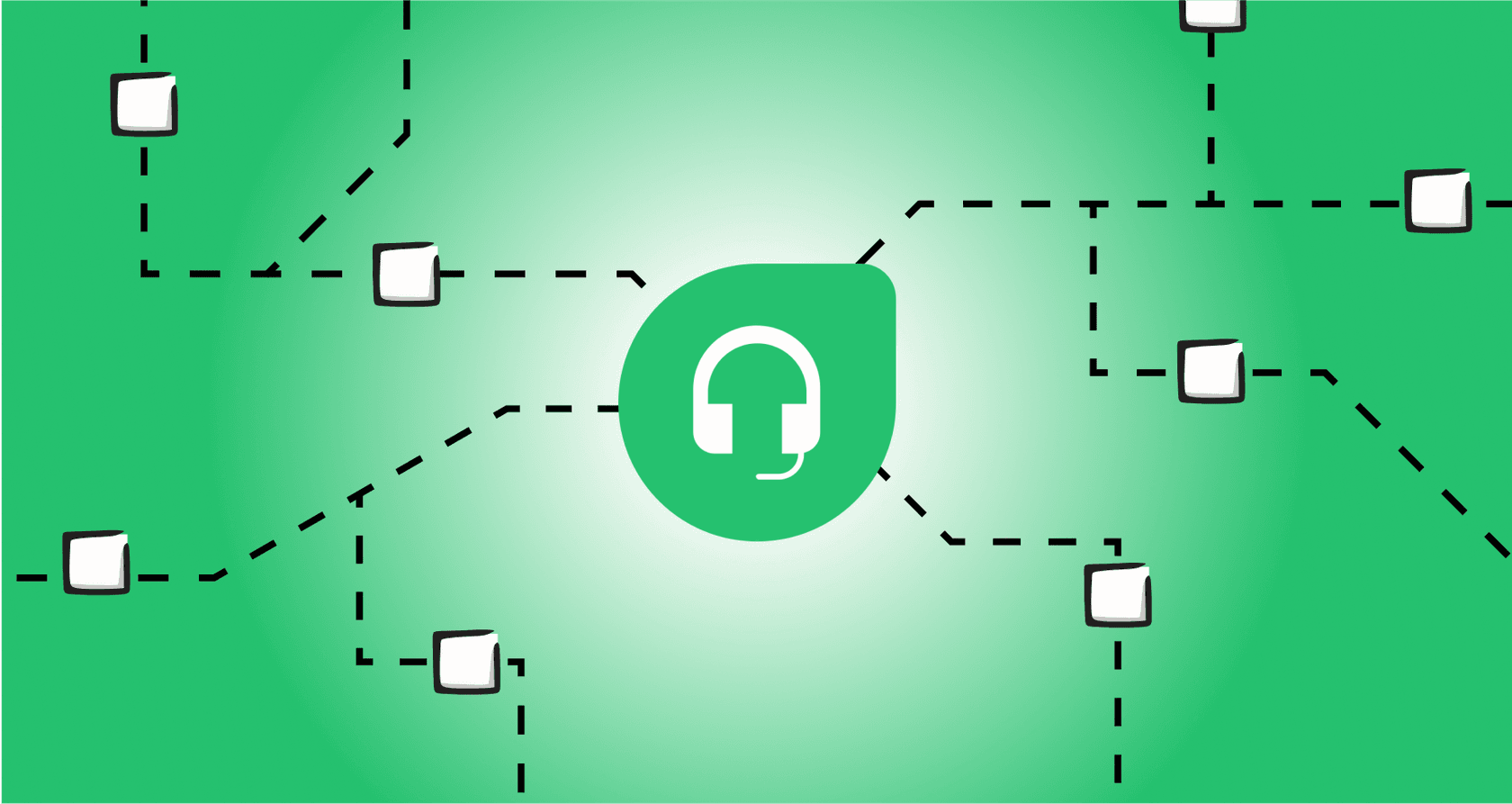A complete guide to Freshdesk Enterprise plan pricing

Stevia Putri

Katelin Teen
Last edited January 16, 2026
Expert Verified

Picking an enterprise help desk is a significant decision, and understanding the pricing options is key to a successful deployment. You're not just looking at a simple per-agent fee: you're looking at the various options, the powerful add-ons that enhance the experience, and the features that will scale with your business.
We're here to provide a clear look at the Freshdesk Enterprise plan pricing. We’ll cover the base investment, the available add-ons, and the details that help you plan effectively. While Freshdesk is a trusted leader in customer support, it is also useful to know that complementary AI solutions can add even more flexibility to your setup. Let's get into it.
What is Freshdesk?
So, what's Freshdesk all about? It's a reliable, cloud-based customer support tool that helps companies manage customer conversations across multiple channels. Think of it as a central hub for your support team, providing a shared ticketing system, a knowledge base for self-service, and robust reporting. It has been a staple in the industry for years, trusted by thousands of businesses globally.

A deep dive into Freshdesk Enterprise plan pricing
To create an accurate budget for the Freshdesk Enterprise plan, it is helpful to look at the full range of value it offers. It is a highly capable platform, and its various enhancements, especially the AI features, allow you to tailor the system to your specific goals.
The advertised base price is $79 per agent per month if you pay annually, or $95 per agent per month if you go month-to-month. This provides a solid foundation for enterprise support.
How Freddy AI add-ons affect Enterprise plan pricing
Freddy is Freshdesk’s AI assistant, and it is a powerful part of the ecosystem. The plan allows you to add specific AI capabilities as needed, so your investment scales with your requirements.

-
Freddy AI Copilot: This tool assists your agents by summarizing tickets and drafting replies. You can add this for $29 per agent, per month. For teams looking to empower their agents with AI, this is a valuable addition.
-
Freddy AI Agent: This is the bot that handles conversations and helps resolve tickets automatically. The plan includes 500 sessions a month to get you started. Beyond that, it is $100 for every 1,000 sessions. This usage-based model ensures you only pay for the value the bot provides as your traffic grows.
-
Freddy AI Insights: This feature provides advanced analytics on your bot’s performance. It is available to those using Freddy AI Copilot, offering a comprehensive suite of AI tools to refine your strategy.
Other potential costs to consider
As you scale, there are other considerations that can enhance your setup:
-
Day Passes: If you need to bring in experts from other teams for specific tickets, Day Passes are a great solution. On the Enterprise plan, each one costs $12. This is an efficient way to manage cross-departmental collaboration.
-
Connector App Tasks: For workflows that integrate with other applications, you may choose to scale your "connector app tasks" based on your automation needs.
-
Implementation and training: Setting up a robust system like Freshdesk is a professional undertaking. You might choose to dedicate internal resources or work with specialists for setup, data migration, and training to ensure a smooth transition. These investments help maximize the long-term ROI of the platform.
| Feature | Base Plan Cost (Annual) | Included? | Additional Cost | Key Consideration |
|---|---|---|---|---|
| Per Agent License | $79/agent/month | Yes | - | This is your core investment that scales with your team. |
| Freddy AI Copilot | - | No | +$29/agent/month | A powerful addition for agent productivity. |
| Freddy AI Agent | - | Partially | $100 / 1,000 sessions | A flexible cost based on customer engagement. |
| Day Passes | - | No | $12 / pass | Scalable option for cross-team collaboration. |
| Implementation | - | No | Varies (Internal/External) | A one-time investment to ensure optimal setup. |
Key features and considerations of the Enterprise plan
The Enterprise plan offers an extensive toolkit for large organizations. Understanding how these features work together is essential for your planning.
What you get with the Enterprise plan
The plan includes a sophisticated set of tools designed for high-volume support environments:
-
Skill-based ticket assignment: This automatically routes tickets to the most qualified agent, improving resolution times and customer satisfaction.
-
Sandbox environment: This provides a secure area to test new workflows or configurations before they go live, ensuring stability for your help desk.
-
Audit logs and IP whitelisting: These provide the enterprise-level security and oversight required by many modern businesses.
-
Approval workflows: This allows you to automate internal processes that require manager sign-off, such as refunds or special requests.
-
Custom object analysis: This lets you track data specific to your business model, such as product SKUs or custom subscription levels.
Key considerations for implementation
While the feature list is impressive, the platform's comprehensive nature involves some operational considerations:
-
Comprehensive setup period: The inclusion of a "Sandbox" reflects the platform's focus on stability. Setting up Freshdesk correctly is a thorough process that ensures everything works perfectly. While it may take a few weeks to fully configure, this ensures a robust and reliable system for the long term.
-
Internal knowledge focus: Freshdesk's AI is highly effective at utilizing your Freshdesk knowledge base and historical tickets. If you have significant data in other tools like Google Docs or Confluence, you may consider integrated tools to help bridge those knowledge sources.
-
Technical customization: Freshdesk offers deep customization, and for specialized internal systems, technical expertise can help you get the most out of these workflows.
-
AI performance evaluation: The Sandbox is excellent for workflow testing, and once your AI is live, you can use real-world data to refine its performance and maximize your automation success.
A flexible and complementary option: eesel AI
If you are looking for ways to further enhance your Freshdesk experience, it is worth exploring how complementary AI layers can add value. You don't need to change your entire infrastructure: you can simply add smart AI capabilities to the tools you already use.
That’s where eesel AI comes in. It is an AI platform that integrates directly with your existing help desk (including Freshdesk), providing additional AI power within your current ecosystem.
Rapid deployment with a self-serve setup
eesel AI is designed to be incredibly easy to implement alongside your current tools. With a one-click integration, you can connect your help desk and have an AI agent working in minutes. It is a straightforward way to start exploring AI support without a major project commitment.
Unify your knowledge sources
A great way to enhance help desk AI is to connect it to all your information sources. eesel AI works with Freshdesk and other tools, learning from past tickets, help centers, Google Docs, Confluence, and Slack conversations. This gives your agents and customers access to a unified knowledge base, ensuring thorough and accurate answers every time.

Test with confidence using simulation
Before your AI goes live, eesel AI allows you to run simulations on your historical tickets. This is a risk-free way to see how the AI would have responded, providing an accurate forecast of your potential automation rate. This helps you fine-tune the experience with confidence.
Seamless control and predictable pricing
With eesel AI’s customizable workflow engine, you retain full control over how the AI interacts with your customers. You can start with simple tasks and expand as you see the results.
The pricing is designed to be simple and transparent, with interaction-based plans that make budgeting easy. It is a great way to scale your AI capabilities with total cost predictability.
| Aspect | Freshdesk Enterprise | eesel AI (Complementary Tool) |
|---|---|---|
| Pricing Model | Per agent + flexible AI add-ons | Simple, interaction-based tiers |
| Setup Time | Comprehensive, enterprise-grade setup | Rapid, self-serve integration |
| Knowledge Sources | Optimized for Freshdesk data | Unified across all company knowledge |
| Pre-Launch Testing | Robust sandbox for workflows | Simulation on past tickets for ROI forecasting |
| Customization | Deeply technical and robust | User-friendly, self-serve prompt editor |
Is the Freshdesk Enterprise plan pricing right for you?
So, is the Freshdesk Enterprise plan the right choice? For large teams requiring a secure, feature-rich, and trusted platform, it is an excellent choice. It provides the security and management tools necessary for high-volume support. By understanding the various add-on options, you can build a pricing model that reflects the specific value you need.
While the setup is comprehensive and the AI is focused on internal data, these are hallmarks of a mature platform built for reliability.
For businesses that want to move quickly and further unify their knowledge, a tool like eesel AI is a perfect companion. It enhances your Freshdesk setup, connects to all your information, and offers a predictable way to scale your automation.
Ready for a smarter approach to support automation? Try eesel AI for free and see how it can enhance your Freshdesk experience in just 5 minutes.
Frequently asked questions
The advertised base Freshdesk Enterprise plan pricing is $79 per agent per month (annual) or $95 per agent per month (monthly). This includes robust features like skill-based ticket assignment, a sandbox environment, audit logs, and custom object analysis, with advanced AI features available as tailored add-ons to suit your needs.
Freddy AI add-ons, such as Copilot ($29/agent/month) and AI Agent ($100/1,000 sessions after initial free sessions), are available for teams looking to leverage advanced AI capabilities. These options allow you to scale your AI usage and costs based on your specific requirements.
Other considerations can include Day Passes for external collaborators ($12 each), which are great for cross-team support, and connector app tasks for extensive integrations. Many teams also invest in professional implementation and training to ensure they get the most out of the platform's broad capabilities.
Key considerations include the comprehensive setup process designed for enterprise-grade stability. The built-in AI is optimized to work with Freshdesk's internal knowledge base, and for teams with data across many external tools, complementary integrations can further extend these capabilities. This is a factor in planning your implementation.
The Freshdesk Enterprise plan pricing offers a tiered approach with various add-ons, allowing for a flexible setup that can grow with your organization. While some modern AI solutions offer different structures, Freshdesk provides a comprehensive and trusted ecosystem for large-scale support.
Forecasting is part of the implementation phase, where teams can evaluate their expected session volume and agent needs. While AI performance is typically measured in a live environment, this allows for real-world data to drive your automation strategy and ROI.
The Freshdesk Enterprise plan is an excellent choice for businesses needing a sophisticated, secure ticketing system. While it is optimized for knowledge within the Freshworks ecosystem, it can be easily complemented by tools that help unify data from outside the platform for a complete support experience.
Share this post

Article by
Stevia Putri
Stevia Putri is a marketing generalist at eesel AI, where she helps turn powerful AI tools into stories that resonate. She’s driven by curiosity, clarity, and the human side of technology.





